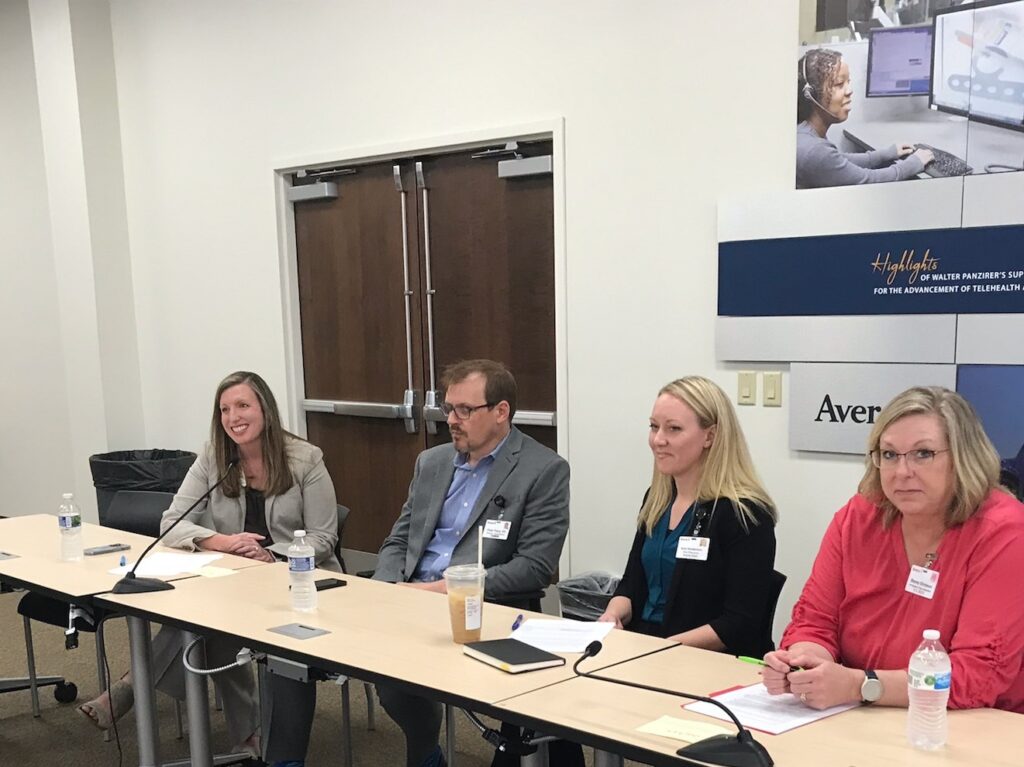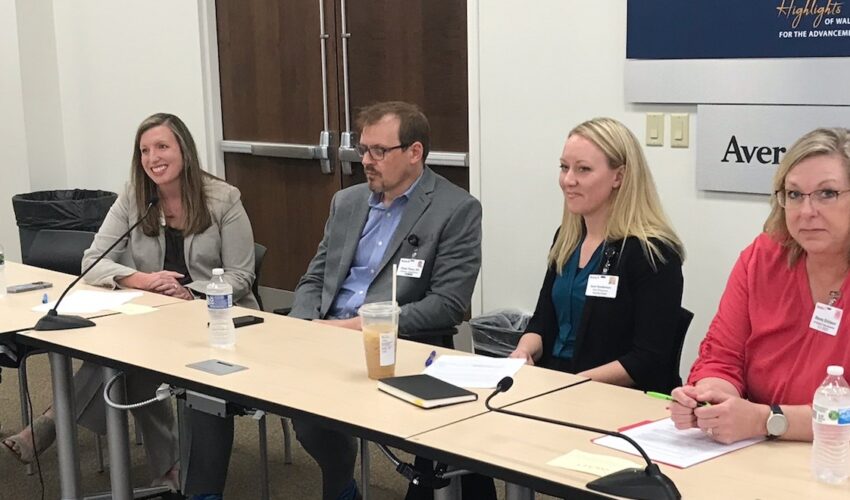Leadership lessons from incident command
May 3, 2023
This paid piece is sponsored by Avera.
The important leadership lessons of perseverance, humility and creativity often come not when everything is going great but when there is conflict and turbulence.
For numerous leaders at Avera, being part of Incident Command during COVID was one of those formative experiences.
Incident Command is a formal way of addressing an out-of-the ordinary event: a tornado or other natural disaster, a bus wreck or a pandemic. Whether practice or real life, each scenario involves an Incident Command, which creates a hierarchy of decision-making and communications, so things don’t end up in a flurry of activity and conversations.
Lindsey Meyers, Dr. Chad Thury, Sara Henderson and Stacey Erickson participate in a recent panel discussion for Avera Aspiring Leaders.
Incident Command has immediate authority to take charge of Avera’s response to the situation, whether that’s a flood, blizzard, hazardous chemical leak or COVID. Health care systems frequently do drills or real incidents utilizing Incident Command, but the pandemic was the longest single incident Avera had ever participated in, lasting over three years.
“We went into COVID Incident Command thinking it was going to be a few-week sprint, so we hit the ground running hard. When it evolved into a multiyear marathon we had to continuously reinvent ourselves and the entire process,” said Dr. David Basel, incident commander and vice president of Avera Medical Group Clinical Quality.
For COVID-19, Avera’s Incident Command brought leaders from across Avera to the table, making the day-to-day and sometimes hour-to-hour decisions to cope with whatever came to pass. Incident Command utilizes a variety of skills. COVID-19 brought together clinical, operations, supply chain, communications, human resources, legal and other expertise.
Here are some of the lessons that Avera leaders will take with them as we have moved from the pandemic into more normal times.
Be prepared, be strong, but be human
Leaders may think they have to be the strongest person in the room. “But really they need to be the most-prepared person in the room,” said Dr. Chad Thury, Avera Medical Group regional medical director of clinical quality. “It was a fearful time. We didn’t know if we would have enough beds for all the people or enough ventilators. It turns out we did, but early on we didn’t know. If you glaze over those emotions, pretty soon you’ll have people who are really struggling.”
“We had to be vulnerable and depend on each other. That meant trusting that everybody was doing their role the best that they could,” said Stacey Erickson, Avera vice president of quality.
It’s impossible to work for 16 days straight without a break. “You have to trust your team and be able to hand it off to someone else and let them learn and rise to the occasion,” said Lindsey Meyers, Avera vice president of public relations.
Erickson said she learned that her personal energy is not unlimited. “I used to think I had an unlimited pile of personal energy to be a nurse, a leader, a mom and a wife. During COVID, my bucket got depleted. I’m much more particular now on how I use that personal energy, and I’m more intentional about filling my own bucket.”
Make the best decision you can with the information you have
“Leaders feel like they have to be right,” Erickson said. But sometimes, leadership means you have to change your mind based on new information. “Also as a leader if you look to your employees to help you to make a better decision, then your teams will be more apt to talk to you.”
Avera had to change guidelines like mask requirements and limiting visitation based on information from the Centers for Disease Control and Prevention. Leaders had to make controversial decisions like reducing elective surgeries to save valuable personal protective equipment when it was in short supply. “It was a balance of doing the right thing for patients, our providers and our employees and also the impact there might be for supply chain,” Thury said.
“So much innovation came out of discussions like, we can’t do this, but we can do that,” said Sara Henderson, vice president of supply chain for Avera. “Being open, transparent and honest helped guide our decisions for the best outcome.”
Incident Command does not utilize typical hierarchy for decision-making. So it’s easy to fall into “imposter syndrome” when you have to step in to fulfill a broad position, Henderson said. “You do your job as best you can, and you have confidence in that.”
“There are those personality types like mine where you feel like you need to make everybody happy. But at some point, you need to make a decision and be confident in that decision,” Thury added.
Be smart, but humble and hardworking
“I never remember a moment on Incident Command when someone was trying to get all the glory. Everyone was humble, and that’s why it was such a good team,” Thury said.
Recognize when you don’t know something, and find out who does have that knowledge. Take the time to ask others “what am I missing.”
“Try to listen more than you talk in any meeting. If you’re always thinking about what you’re going to say next, you’ll miss a lot,” Meyers said. “Give others a chance to share their wisdom. Repeat back what you thought you heard, and learn from them.”
Look for the genius in yourself and others. “There are people around you with lots of different talents and each with a different genius. As a leader, find your own genius and surround yourself with people who are not exactly the same genius as you,” Henderson said.
Learn more about careers at Avera.








